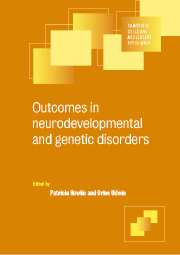Book contents
- Frontmatter
- Contents
- List of contributors
- Preface
- 1 Attention deficit hyperactivity disorder
- 2 Developmental language disorders
- 3 Reading and other specific learning difficulties
- 4 Metabolic disorders
- 5 Hemiplegic cerebral palsy
- 6 Autistic disorders
- 7 Down syndrome
- 8 Fragile X syndrome
- 9 Prader-Willi and Angelman syndromes: from childhood to adult life
- 10 Rett disorder
- 11 Tuberous sclerosis
- 12 Williams and Smith-Magenis syndromes
- Index
9 - Prader-Willi and Angelman syndromes: from childhood to adult life
Published online by Cambridge University Press: 13 August 2009
- Frontmatter
- Contents
- List of contributors
- Preface
- 1 Attention deficit hyperactivity disorder
- 2 Developmental language disorders
- 3 Reading and other specific learning difficulties
- 4 Metabolic disorders
- 5 Hemiplegic cerebral palsy
- 6 Autistic disorders
- 7 Down syndrome
- 8 Fragile X syndrome
- 9 Prader-Willi and Angelman syndromes: from childhood to adult life
- 10 Rett disorder
- 11 Tuberous sclerosis
- 12 Williams and Smith-Magenis syndromes
- Index
Summary
Introduction
The Prader–Willi (PWS) and Angelman syndromes (AS) are two distinct syndromes that have in common either a deletion at the locus 15q11.2 or the presence of other genetic abnormalities of chromosome 15. PWS was the first to be described by Swiss paediatricians in 1956 (Prader, 1956). The main features noted at that time were neonatal hypotonia, impaired sexual development, a propensity to severe obesity and intellectual disabilities (mental retardation). In 1961 Prader and Willi reported on a total of 14 Swiss children with similar characteristics. In the same year in the English literature, Laurance (1961) described six children with the same pattern of phenotypic characteristics. Other reports, from elsewhere in the world, soon appeared (Forssman & Hagberg, 1964; Dunn, 1968). In a paper describing nine children, together with a review of other papers, Laurance (1967) listed the main features as: neuromuscular (neonatal hypotonia); ‘mental disorders’ (i.e., IQs in the low 2% of the population); abnormalities in body configuration (obesity and poor growth); skeletal disorders (mainly scoliosis); characteristic facial appearance (almondshaped eyes, high cranial vault); endocrine abnormalities (risk of diabetes mellitus); and delayed gonadal development. Other features, such as an apparent high pain threshold, were also noted. Although possible chromosome abnormalities were described at that time, the genetic abnormality most commonly associated with the syndrome was not established for over a decade.
Keywords
- Type
- Chapter
- Information
- Outcomes in Neurodevelopmental and Genetic Disorders , pp. 220 - 240Publisher: Cambridge University PressPrint publication year: 2002
- 2
- Cited by

